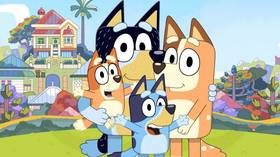Where are the ‘disabled’ & ‘queer’ dogs? Internet perplexed after columnist says kids cartoon not diverse enough

‘Bluey’, an animated series popular with preschoolers, has become the latest culture war victim after a columnist provocatively argued that the Australian show needed a more diverse range of cartoon dogs.
Produced by the Australian Broadcasting Corporation in tandem with the BBC, the series follows a family of canines living in Brisbane. Although native to Australia, the show is available internationally on Disney+ and has become popular with youngsters around the world.
The children’s program even has adult fans. ABC journalist Beverley Wang penned a piece praising certain aspects of the cartoon, including how it has helped her to become a more understanding parent. Her family has even adopted “Bluey-inspired hand signals to communicate with each other without interrupting conversations.”
But there is a dark side to Bluey, according to Wang. As a “parent of color,” Wang expressed dismay over the fact that the program, which is a cartoon about dogs, does not accurately represent the diversity of the real world. This is apparently very detrimental to the preschoolers watching the show, Wang claims.
Also on rt.com BBC diversity chief complains Idris Elba’s TV detective isn’t ‘black enough to be real’, leaves online commentator baffled“Where are the disabled, queer, poor, gender diverse, dogs of color and single-parent dog families in Bluey's Brisbane? If they're in the background, let them come forward,” she wrote.
The critique was not well received among local media. Australia’s Courier-Mail ran a response in which it cited an academic who accused the ABC of peddling “the same old tired identity politics” that the public has come to expect from the broadcaster.
“The fact that the ABC sees a children’s program about a dog through the lens of race, class and gender shows just how out of touch they are with mainstream Australians,” Evan Mulholland, Director of Communications at the Institute of Public Affairs, was quoted as saying.
There was a similarly chilly reception on social media.
Columnist Rita Panahi described the Bluey review as “peak ABC” and a “piece of taxpayer funded dross.”
‘Where are the disabled, queer, poor, gender diverse, dogs of colour and single-parent dog families in Bluey's Brisbane?’Direct quote from this piece of taxpayer funded dross. Peak ABC. pic.twitter.com/By60Vl1Rtn
— Rita Panahi (@RitaPanahi) April 14, 2021
Some commenters tried to unpack Wang’s arguments, noting that the cartoon actually features dogs of varying colors.
“One is blue. One is orange. None are black though so, yeah, not inclusive,” joked one observer.
One is blue. One is orange. None are black though so, yeah, not inclusive
— Bates Machina 8:18 (@batesmachina818) April 14, 2021
The show features different dog breeds, and the fact that it doesn’t focus on sexuality shouldn’t come as a surprise, given that it’s marketed to six-year-olds, noted another Twitter user.
There are lots of different breeds of dog in this cartoon show. Oh and the target audience is <6, so diverse sexual preferences is a pretty weird thing to expose young kids to.
— Andy Dufresne (@AndyDuf06795717) April 14, 2021
Wang took notice of the flak she was receiving and pushed back against her detractors. She described her article as “essentially a love letter” to Bluey, adding that it included a “very gently-phrased wish to see if a great show can push itself to do even better.” She joked about people who thought she was unhinged for talking about the lack of diversity on the program, and insisted that “young children are aware of racism and sexism.”
But! Apparently I have an *unstable mind*. I'm *obsessed* and*unhinged* for politely wondering whether Bluey's Brisbane can be more like the real Brisbane.It just goes to show that politics are everywhere, and representation matters. Thanks for proving my point. pic.twitter.com/jJrM7CUhJa
— Beverley Wang (@beverleywang) April 14, 2021
Think your friends would be interested? Share this story!














